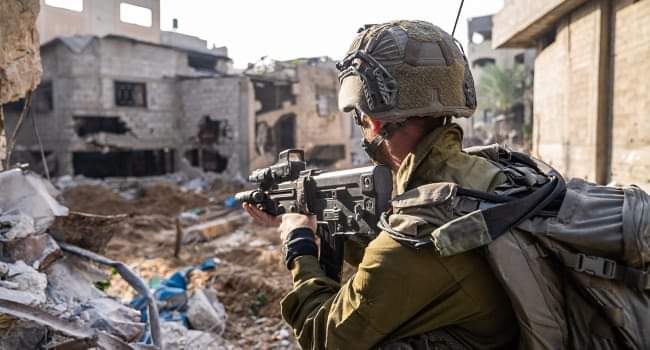Isreali Strike On Gaza Kills 200 People In 24 Hours, Says Hamas

Israel pressed on with its offensive focusing on the southern Gaza Strip, with clouds of grey and black smoke rising over Khan Yunis city. AFPTV images also showed black smoke drifting over the north.
Gaza officials said Saturday that more than 200 people had been killed in Israeli strikes in 24 hours, as violence rages on after a UN resolution demanded more aid into the besieged territory.
Israel pressed on with its offensive focusing on the southern Gaza Strip, with clouds of grey and black smoke rising over Khan Yunis city. AFPTV images also showed black smoke drifting over the north.
The health ministry in Hamas-run Gaza reported 201 deaths in the past 24 hours across the territory, updating the death toll since the start of the war to 20,258, most of them women and children.
Fighting began on October 7 when Hamas militants broke through Gaza’s border and killed about 1,140 people in Israel, mostly civilians, according to an AFP tally based on Israeli figures.
Israel in response vowed to destroy Hamas and launched a relentless bombardment and ground invasion of Gaza.
Saturday’s strikes came after the Security Council approved a resolution demanding “immediate, safe and unhindered” deliveries of life-saving aid to Gaza “at scale.”.
It also called for the creation of “conditions for a sustainable cessation of hostilities” but did not seek an immediate end to combat.
Members had wrangled for days over the wording, and it is still unclear what if any impact the vote will have on the ground.
At Washington’s insistence, they toned down some provisions and avoided calling for a ceasefire that would stop the war.
The Gaza health ministry said dozens of Palestinians were killed this week and publicly “executed” in northern Gaza.
The Israeli “massacre resulted in the deaths of dozens” of people in Jabalia camp and Jabalia town, ministry spokesman Ashraf al-Qudra said.
When contacted by AFP, the Israeli army did not directly comment on the allegations but said it ensures that its “strikes against military targets comply with the provisions of international law.”.
Hamas ‘lost contact’ with hostage guards –
With 1.9 million Gazans displaced, according to UN figures, out of a population of 2.4 million, many have been forced into crowded shelters or tents, struggling to find food, fuel, water and medical care.
UN Secretary-General Antonio Guterres said a “humanitarian ceasefire” is the only way for aid “to be effectively delivered.”.
The issue is not the number of aid trucks, he said, but “the way Israel is conducting this offensive is creating massive obstacles” to aid distribution.
Immediately after the UN vote, Israel again vowed to fight on until Hamas is “eliminated” and hostages are freed.
“Israel will continue the war in Gaza,” said Foreign Minister Eli Cohen, insisting it was legal and just.
A strike, which the Palestinian health ministry said killed four members of the same family, including a girl in Rafah, in southern Gaza, targeted a Hamas arms procurement official on Friday, Israel’s army said.
It said Hassan al-Atrash was responsible for weapons purchase and manufacturing for the group’s armed wing, the Ezzedine al-Qassam Brigades, and helped smuggle arms into Gaza.
Abu Obeida, a spokesman for the Hamas armed wing, said the group had “lost contact” with militants tasked with guarding five Israeli hostages, out of about 250 captives, including foreigners, seized from Israel on October 7.
The five hostages include three elderly men who appeared in a video from captivity, released by Hamas earlier this week.
“We believe that those hostages have been killed” in Israeli strikes, Abu Obeida said without providing evidence. There was no immediate comment from Israel.
Israeli authorities say 129 hostages remain in Gaza.
– Displaced again –
The Palestinian health ministry said on Saturday that 18 people were killed in a strike on a house at the central Nuseirat refugee camp and reported others up and down the Gaza Strip.
At Nasser Hospital in Khan Yunis, men gently led a weeping woman who had seen the bodies of relatives. A man crouched down in tears, his hand resting on a black body bag. Outside, others prayed before another corpse.
“This is genocide,” said Rafat al-Aydi, standing before the bodies, which lay under a bush of bright red flowers.
Allies, including the United States, which provides Israel with billions of dollars in military aid, have increasingly pressured Israel to avoid civilian casualties.
A one-week truce that Qatar helped mediate, with support from Egypt and Washington, ended on December 1. It saw 80 Israeli hostages released from Gaza captivity in exchange for 240 Palestinian prisoners.
Israel has repeatedly told Palestinians to make their way to areas in the tiny territory it says are safe, but even when they do, residents say they have still been bombarded.
World Health Organization chief Tedros Adhanom Ghebreyesus said most of the displaced were now going “entire days and nights without eating” and “famine is looming.”.
On Friday, thousands fled central Gaza after an army evacuation order.
It warned residents of the Bureij refugee camp to move “for their security” towards Deir al-Balah city further south.
The UN agency for Palestinian refugees, UNRWA, said the latest evacuation order would affect more than 150,000 people.
“The Israeli army just orders people to move into areas where there are ongoing air strikes,” Thomas White, UNRWA’s Gaza director, wrote on social media.
– Drone strike off India –
Far from Gaza, a new attack on shipping Saturday added to fears of a regional escalation.
Maritime agencies said a drone strike damaged a merchant ship in waters off Veraval, India. There was no claim of responsibility.
Missiles from Yemen’s Iran-backed Huthi rebels, who say they act in solidarity with Gaza, have already disrupted Red Sea shipping.
US National Security Council spokeswoman Adrienne Watson said Iran “was deeply involved in planning the operations against commercial vessels in the Red Sea”.
But Iranian deputy foreign minister Ali Bagheri denied the allegations, saying the Huthis act on their “own decisions and capabilities”.
There also have been cross-border skirmishes between Israeli forces and Lebanon’s powerful Hezbollah movement which, like Hamas, is backed by Iran.






